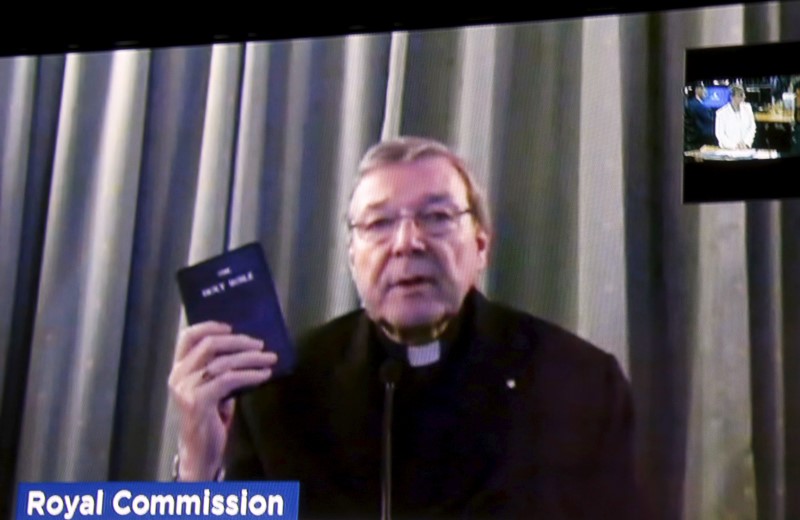By Philip Pullella and Jane Wardell
ROME/SYDNEY (Reuters) - Australian victims of sexual abuse by Roman Catholic Church clergy on Tuesday called for a meeting with Pope Francis after watching a high-ranking Vatican official testify that senior clergy lied to him to cover up abuse in the 1970s.
Cardinal George Pell, the Vatican's treasurer, has told the inquiry that the church made "enormous mistakes" and "catastrophic" choices by refusing to believe abused children, shuffling abusive priests from parish to parish and over-relying on counselling of priests to solve the problem.
Given Pell's high rank within the church, his testimony to Australia's Royal Commission into Institutional Response to Child Sexual Abuse over cases that occurred decades ago has taken on wider implications about the accountability of church leaders.
Pell's failing memory to questions about what he knew of abuse by clergy and claims that he was deceived by superiors about individual cases in the 1970s has angered many of the 15 abuse victims and supporters who travelled to Rome to see him give evidence.
Pell repeatedly said he could not recall particular events and, in one testy exchange, denied a suggestion from special prosecutor Gail Furness that his claims that he was not briefed properly on abusive priests was "implausible."
During a break in testimony, the victims in Rome released a statement they have faxed to the Pope: "This is about children. Children who were abused and damaged in the past. ... We would like to request a meeting to discuss the commitment to the children of the past and children of the future, to implement systems so that this is never repeated again."
The group, who travelled to Rome after Pell said he was unable to travel to his native Australia because of heart problems, said they had requested a meeting before they fly back to Australia on Friday.
Philip Nagle, who was abused as a child, said the group has become frustrated with Pell's evidence to the inquiry and no longer wanted to meet with the Cardinal at the end of his evidence as scheduled.
"We want to be heard and we want someone to show that they care about us and who can possibly help change things for children into the future," Nagle told reporters.
"SEE NO EVIL"
Pell's evidence, which adds to testimony from almost 5,000 survivors according to Commissioner Peter McClellan, has received wide coverage in Australia.
McClellan repeatedly interjected to suggest that Pell could and should have done more when as a more senior cleric in the 1990s he was told about specific abuse cases.
In Australia, the front page of the Herald Sun newspaper printed a full page photo of Pell leaving the hearing with the headline "See no evil, hear no evil, stop no evil." The Sydney Morning Herald blared "Pell under fire."
Last year, Pell denied accusations made at Commission hearings that he had tried to bribe a victim to remain quiet, that he ignored another complaint and that he was complicit in the transfer of a paedophile priest.
Church sexual abuse broke into the open in 2002, when it was discovered that U.S. bishops in the Boston area moved abusers from parish to parish instead of defrocking them. Similar scandals have since been discovered around the world and tens of millions of dollars have been paid in compensation.

The Australian hearing started on the same night that Spotlight, a film about newspaper reporters who uncovered systemic paedophilia in the Church in Boston, won the Academy Award for best picture.